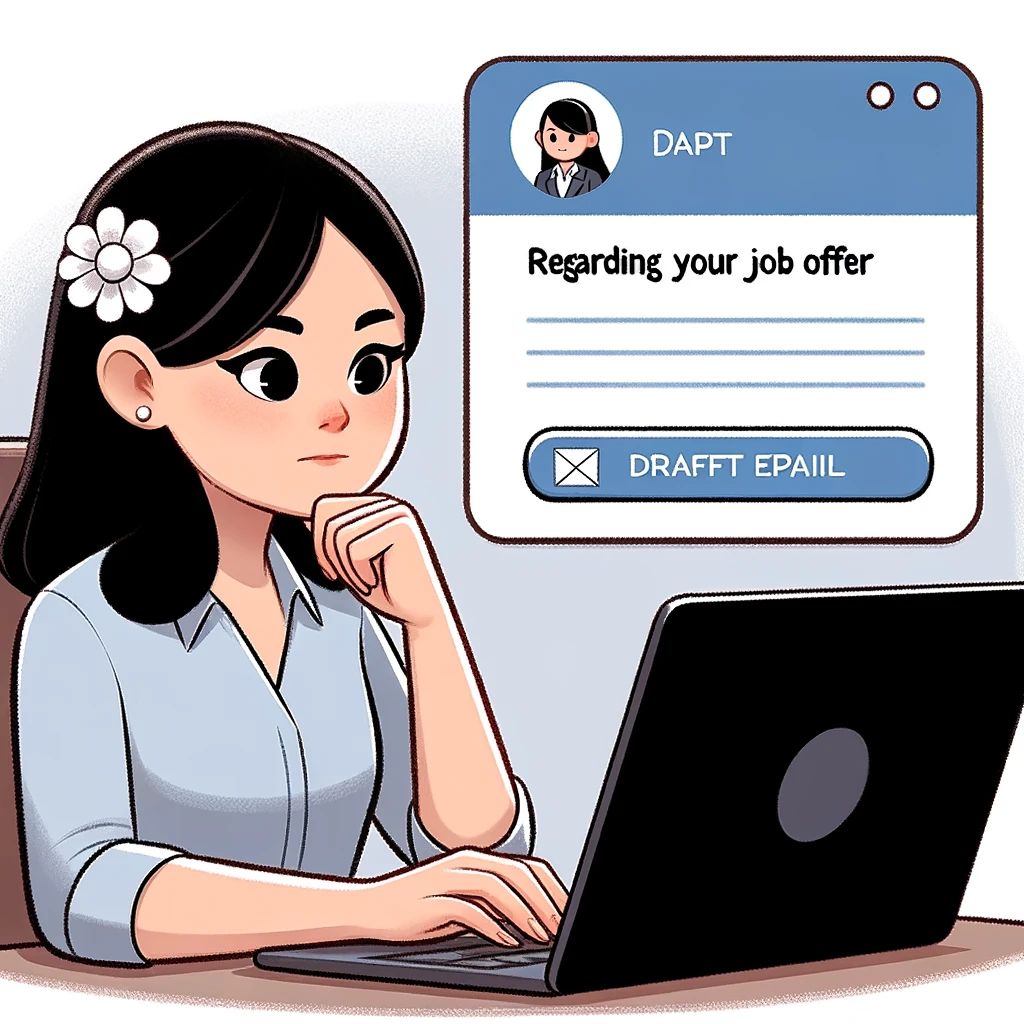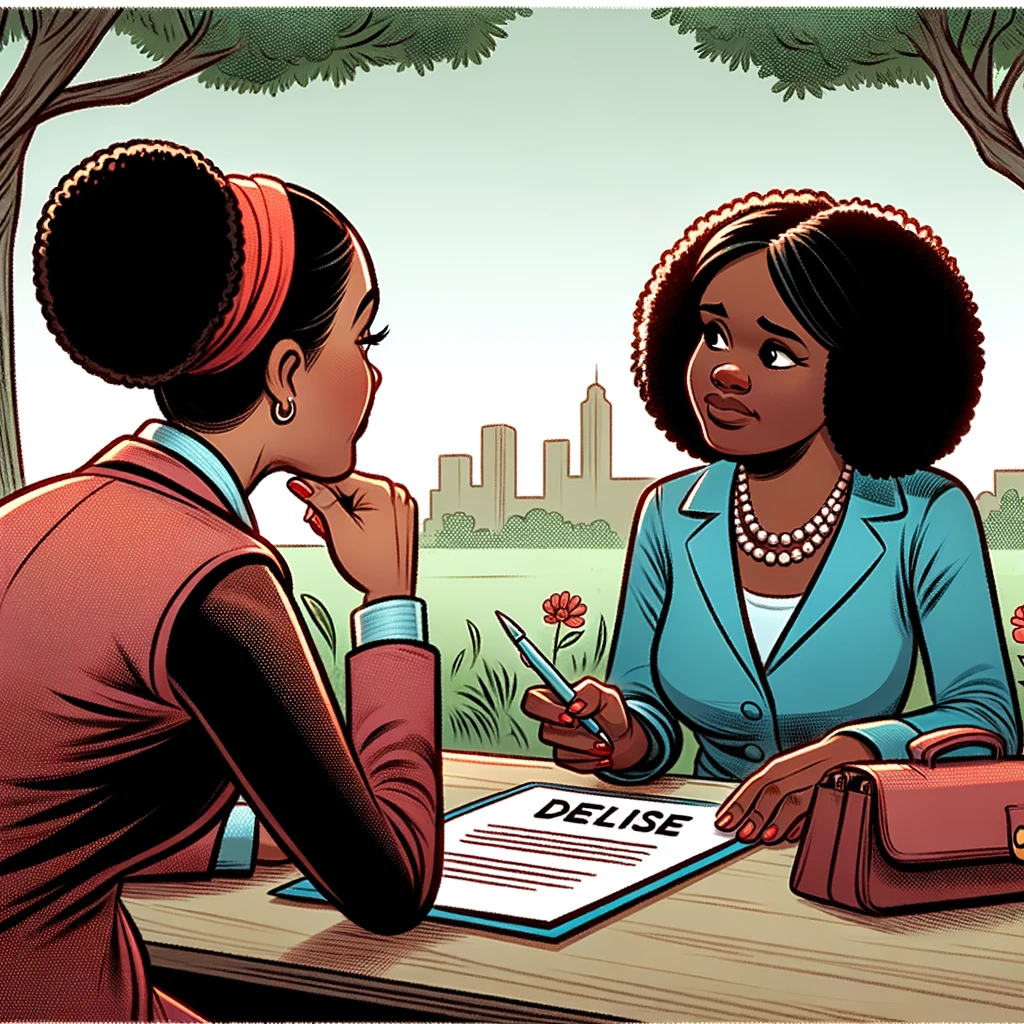Estimated reading time: 13 mins
You’d be surprised to learn that few people actually know how to decline a job offer properly. Navigating through job offers is an integral part of any professional journey. Sometimes, this path involves not just accepting the right job but also declining others. The decision to turn down a job offer, while often difficult, is a vital skill in managing your career trajectory. Whether the role doesn’t align with your career goals, the compensation falls short of your expectations, or the company culture isn’t the right fit, knowing how to decline a job offer respectfully and professionally is essential.

This task, though daunting, is critical for maintaining professional relationships and keeping doors open for future opportunities. In this guide, I’ll walk you through each step of how to decline a job offer. From reflecting on your decision to communicating it effectively, I aim to provide a clear and respectful approach to this challenging situation. Remember, it’s not just about the job you’re turning down; it’s about handling the situation in a way that upholds your professional integrity and future prospects.
How to Decline a Job Offer in 12 Steps
1. Reflect on Your Decision to Decline the Job Offer
Before you communicate your decision, take a moment to reflect deeply. This is more than just saying ‘no’ to a job offer; it’s a pivotal decision that can significantly impact your career trajectory. Start by considering your core reasons for declining. Is it the role that doesn’t excite you, or perhaps the company’s values don’t align with yours? Maybe the offer falls short in terms of compensation, advancement potential, location, or work-life balance.
Reflect on your long-term career goals and how this position fits into that picture. It’s essential to be honest with yourself during this process. Are there unresolved concerns that could be addressed with further negotiation, or is the decision final? This reflection is not just about the immediate role but about how it aligns with your overall career aspirations and personal values. Making a thoughtful decision on how to decline a job offer now can save you from potential regrets or career missteps in the future.
2. Don’t Delay
Once your decision is made, timing is key. It’s crucial to act promptly in conveying your choice. Understand that the hiring process is often a long and arduous one for employers. They’ve invested time and resources in it, and your prompt response respects that effort. Delaying your response can inconvenience the employer, potentially impacting their timelines and decisions regarding other candidates. More importantly, it reflects on your professionalism. Procrastination might suggest indecision or disregard for the employer’s time, which isn’t the impression you want to leave. By responding quickly, you demonstrate respect and consideration for the company’s needs. This doesn’t mean rushing your decision-making process. It means once you’re certain of your decision, don’t wait. Reach out to the hiring manager or HR representative. A timely response not only closes this chapter for you but also allows the company to proceed with other potential candidates without unnecessary delay.
3. Express Gratitude for the Job Offer
Initiating your response with gratitude is more than just a formality; it’s an acknowledgment of the opportunity provided. Expressing thanks shows your appreciation for the time and resources the employer invested in considering you. Mention specific aspects of the process you valued, whether it was the insightful interview, the warm interaction with the team, or the overall learning experience about the company. This personal touch demonstrates your professional grace and leaves a lasting positive impression.
Remember, the business world is surprisingly interconnected, and a gracious response can foster ongoing respect and potentially beneficial connections. Even though you’re declining the offer, this is an opportunity to build a bridge for future interactions. An appreciative tone in your communication underscores your professionalism and can distinguish you as a considerate and respectful candidate in the eyes of the employer. Gratitude is an obvious, yet often forgotten, aspect of how to decline a job offer properly.
4. Be Clear and Concise
When it’s time to convey your decision, clarity and conciseness are key. Start by directly stating that you’ve decided to decline the job offer. This isn’t the time for vagueness or beating around the bush. Your goal is to communicate your decision in a straightforward manner, leaving no room for misinterpretation.
However, while being clear, it’s also important to be concise. Elaborate explanations or lengthy justifications aren’t necessary and can often complicate the conversation. Stick to a few sentences that convey your decision respectfully. For instance, you might say, “After careful consideration, I’ve decided to decline the job offer.” This simple statement is clear and to the point.
Remember, the employer values your honesty and would appreciate a prompt and straightforward response. It shows respect for their time and the effort they put into the hiring process. By being clear and concise, you ensure the message is received as intended and maintain a professional demeanor.
5. Give a Reason, but Keep it Brief
While declining a job offer, it’s courteous and professional to provide a reason for your decision. However, this part of the conversation requires a balance between honesty and tact. You don’t need to delve into personal details or extensive explanations. A simple, straightforward reason suffices. For instance, if you’ve accepted another offer, just state that you’ve found a role that aligns more closely with your career objectives. If it’s about the role not fitting your career path, mention that you are seeking a position with different responsibilities or growth opportunities.
It’s crucial, however, to steer clear of negative comments about the company or the people you interacted with. Even if your interview experience wasn’t ideal, maintain a positive and professional tone. Your goal is to close the door gently, leaving no room for misunderstandings or hard feelings. Remember, the aim is not just to decline the offer but to do so in a way that preserves relationships and your professional reputation.
6. How to Decline a Job Offer and Stay Professional
A perhaps obvious feature of how to decline a job offer is staying professional. This is not merely about a single job; it’s about your long-term professional reputation. The way you handle this situation can leave a lasting impression. Therefore, it’s important to communicate your decision with the same level of professionalism as you would in accepting a job. Use respectful language and a polite tone in both your verbal and written communications. Avoid negative comments about the company or the role. Even if you had concerns, this is not the time to air them.
Remember, the world is small, and industries even smaller. The people you interact with now might play a significant role in your future career. By maintaining professionalism, you ensure that your paths can cross again under positive circumstances. Additionally, a professional approach demonstrates your maturity and respect for the process, showcasing your soft skills and character to potential future employers.
7. Offer to Stay in Touch
This is an expert tip on how to decline a job offer that many people miss out. If you find the company or the team appealing, suggest keeping the lines of communication open. Expressing a desire to stay in touch isn’t just polite; it’s strategic networking. In the world of careers, connections are invaluable. You never know what opportunities might arise from a well-maintained professional relationship. Let them know that you’re impressed with their organization and would be interested in future possibilities. This can be as simple as connecting on LinkedIn, exchanging emails, or even following their corporate journey.
By doing so, you’re not just closing a door; you’re potentially opening a window for future opportunities. It’s about building a network, not just for immediate gains, but for long-term career growth. Remember, today’s declined offer could be the seed for tomorrow’s perfect job opportunity. Always leave a positive, lasting impression that keeps you in their thoughts for future roles that might be a better fit.
8. How to Decline a Job Offer in Writing


After your initial conversation or communication where you’ve verbally declined the offer, it’s crucial to follow up with a written confirmation. This isn’t just a formality; it’s a significant step in ensuring clarity and professionalism. This really is a non-negotiable when it comes to how to decline a job offer. Your email should succinctly restate your decision to decline the offer. Start by expressing your gratitude again for the opportunity. Mention how appreciative you are for the time and resources they invested in your candidacy. Then, clearly reiterate that, after careful consideration, you’ve decided to decline the offer. Be sure to maintain a positive and respectful tone throughout.
This written record is not only a professional courtesy but also serves as a clear communication of your decision, eliminating any potential misunderstandings. It’s also an opportunity to leave the door open for future interactions. You might want to express your interest in staying connected or your hope to cross paths in another professional context. Remember, the world is small, and the professional network is even smaller. How you handle this interaction can leave a lasting impression, so make it count.
9. Be Prepared for a Counteroffer
When you decline a job offer, be prepared for the possibility of a counteroffer. Employers sometimes respond with an improved proposal to entice you to reconsider. This could involve higher compensation, better benefits, or a more suitable role. Before you find yourself in this situation, think about what your response would be. Will a higher salary or a different position change your decision? It’s important to understand your own priorities and deal-breakers. If you’re committed to declining, stay courteous but firm in your response.
Explain why the original reasons for your decision still stand, even in the face of a counteroffer. However, if you’re open to reconsideration, it’s alright to express interest in discussing the new terms. Remember, this is a significant decision, so take the time you need. Be honest with yourself about what you truly want in your career and don’t be swayed by short-term gains if they don’t align with your long-term goals.
10. Learn From the Experience
Every declined job offer is a unique learning opportunity. Take a moment to reflect on the reasons behind your decision. Was it the job role that didn’t align with your aspirations? Perhaps the company culture wasn’t the right fit, or the compensation didn’t meet your requirements? Understanding these factors deepens your insight into what you truly seek in your professional life. This reflection is crucial for future job searches, helping you to better identify opportunities that align with your career goals and personal values.
Additionally, consider the negotiation process. Were there parts of it that you could have handled better? Maybe there were questions you wished you had asked earlier. Use this experience to refine your approach in future interviews and discussions. Essentially, every job offer, whether accepted or declined, is a stepping stone in your career path, contributing to a more informed and focused journey towards your ideal job.
11. Don’t Overthink How to Decline a Job Offer
Once you’ve made the decision to decline a job offer, it’s crucial to avoid overthinking your choice. Second-guessing yourself can lead to unnecessary stress and doubt, which isn’t productive. Remember, you made this decision for valid reasons, whether they were about personal growth, financial considerations, or a mismatch in values or goals. Trust in your judgment and the thought process that led you here. It’s natural to wonder about the ‘what ifs,’ but dwelling on these hypotheticals won’t change your decision. Instead, focus your energy on the future. Look forward to new opportunities and challenges that align more closely with your aspirations and values.
Every decision we make, including declining a job offer, is a step forward in our career path. Use this experience to refine your understanding of what you’re looking for in a job. This clarity will be invaluable as you continue your professional journey. Remember, your career is a long-term endeavor, and each choice you make shapes its trajectory in a way that best suits your personal and professional growth.
12. Focus on the Future
Now that you have declined the offer, it’s time to turn your attention forward. Remember, each job offer, whether accepted or declined, is a stepping stone in your career path. It brings clarity about what you’re looking for in your professional life. Use this experience to sharpen your job search criteria. What did this offer teach you about your preferences, deal-breakers, or career aspirations? Let these insights guide your future applications.
Also, keep nurturing your network. Relationships in the professional world are invaluable. The connections you make today can open doors tomorrow. Attend industry events, engage in online forums, or reach out to mentors. Each interaction is a potential lead to your ideal job.
Above all, maintain a positive outlook. Job searching can be a rollercoaster, filled with highs and lows. Stay resilient and focused. Your determination and positive attitude are your greatest assets on this journey. The right opportunity is out there, and with persistence and a clear vision, you’ll find it.
13. Reflect on the Bigger Picture
Turning down a job offer isn’t just about the immediate decision. It’s an opportunity to consider your broader career goals. Take a moment to reflect on where you see yourself in the coming years. What kind of roles, companies, and industries align with your long-term aspirations? This reflection can provide valuable insights into your career path and help you make more informed decisions in the future. It also helps in understanding what truly matters to you in a job – be it growth opportunities, work-life balance, company values, or the nature of the work itself.
Additionally, this process can reveal areas where you might want to upskill or gain more experience. In essence, each job offer, whether accepted or declined, is a stepping stone in your career journey. It’s about learning, growing, and moving closer to your ultimate professional goals. Use this experience to sharpen your vision for your future and strategize your next steps accordingly.
Wrapping Up How to Decline a Job Offer


I hope I have shown you how to decline a job offer competently, professionally and courteously. Declining a job offer is more than a single moment of saying ‘no.’ It’s a complex decision that intertwines with your professional ethos, future career trajectory, and personal growth. Every time you face this decision, it’s an opportunity to reinforce your career objectives and professional reputation. Handling it with grace, clarity, and professionalism speaks volumes about your character and integrity in the workplace.
Remember, the world of work is interconnected, and today’s declined offer could lead to tomorrow’s unexpected opportunity through the relationships and impressions you leave behind. So, approach each situation with a forward-thinking mindset. Respect and gratitude go a long way in maintaining and building your professional network. Finally, embrace the learning process that comes with each decision. Your career is a journey of continuous growth and each choice, including declining an offer, is a part of shaping your unique path. Keep moving forward with confidence, knowing you’re making decisions aligned with your personal and professional aspirations.
If you have learned how to decline a job offer effectively, please leave a comment below.
